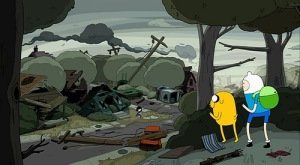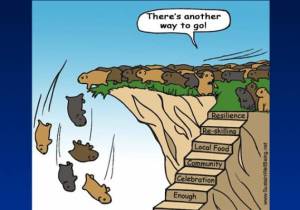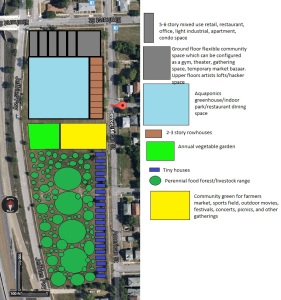I remember learning in high school Western Civilization class that the Roman Empire, including the Old Republic, lasted 1,000 years. I remember marveling at that number, wondering what it would be like to be a citizen living near the end of the empire, gazing back over 1,000 years of your State being the most powerful force on earth. It must have felt as though it was eternal, invincible, always to be. And yet, through the lens of history, I knew what was in store for that citizen of Rome. I wondered how they would have taken watching this god-like force systematically crumble to ruin. Would they have been able to comprehend it? Could they have seen it coming? Could they have done anything to change what is now viewed as inevitable?
Here, at this moment in time, I feel I’ve no more need to wonder.
It seems, this time on a much more global scale, that Western Civilization is once again slipping into the abyss. The cause of this decline, though there are many, just as Rome had many, is chiefly due to the decline of cheap, abundant, easily accessible oil; the lifeblood of our modern age. Yes, dear reader, this is the end, or damn near it. It won’t happen all at once nor evenly to all people because, as many commentators on the issue are fond of saying, “complex systems collapse in complex ways”. I won’t dive to far into the weeds here about how I’ve come to believe this, I’ll put links at the end of this post to sources that have helped shape my views. I will give you this bit of food for thought, though: the days of striking it rich as easily as Jed Clampett shooting at his food are, for the most part, long gone. All the hype about deep water drilling, fracking, tar sands, and so forth all gloss over the fact that each method takes a lot more energy to produce than methods we used to rely on more. That means we get a lower energy return on energy invested ratio (EROEI) than we used to, meaning we need to use more energy to drill more to get the same energy at the end product. Fossil energy production is in decline.
It seems, this time on a much more global scale, that Western Civilization is once again slipping into the abyss. The cause of this decline, though there are many, just as Rome had many, is chiefly due to the decline of cheap, abundant, easily accessible oil; the lifeblood of our modern age. Yes, dear reader, this is the end, or damn near it. It won’t happen all at once nor evenly to all people because, as many commentators on the issue are fond of saying, “complex systems collapse in complex ways”. I won’t dive to far into the weeds here about how I’ve come to believe this, I’ll put links at the end of this post to sources that have helped shape my views. I will give you this bit of food for thought, though: the days of striking it rich as easily as Jed Clampett shooting at his food are, for the most part, long gone. All the hype about deep water drilling, fracking, tar sands, and so forth all gloss over the fact that each method takes a lot more energy to produce than methods we used to rely on more. That means we get a lower energy return on energy invested ratio (EROEI) than we used to, meaning we need to use more energy to drill more to get the same energy at the end product. Fossil energy production is in decline.
When people have looked at this issue and gotten passed the phase that everything can continue as usual (denial) and come to the conclusion that massive change will happen one way or another, as I have come to believe, they generally react in one of three ways. There’s the manic hedonist (anger) who figures past generations have screwed us over so much that there’s little hope of long term survival and the best thing to do is to squeeze as much life out of the system while we can, without care for future generations. There’s the doomer (depression) who wallows in despair and makes no attempt to change what is seen as inevitable. Finally, there’s the techno-optimist (bargaining), convinced the wonders of technology will save us with high-tech, clean, green solutions that will let us keep our lifestyles, just tweak things to take away the environmental impacts our technologies make.
So, what’s a well-meaning, environmentally-conscious activist, who doesn’t accept the aforementioned courses, to do? I say turn and face the strange. Embrace decline (acceptance) as the likeliest course for Civilization, and work on adapting for the future and setting up configurations that may stand after the dust of Civilization’s fall has settled.
There are, of course, barriers to this kind of reconfiguration. The inertia of Civilization is great. The cults of material progress and infinite growth hold not only our minds, but our actions, in a vice grip. Sure, you could disconnect from the grid, go live a subsistence life in the wilderness, and actually live your values completely. But you sacrifice relevancy, meaningful input, and persuasive power to change the narrative of modern culture. Also, if and when the armatures of law and policing do fail with the rest of Civilization, you would find yourself in a more vulnerable position because the next ruler of the land may feel no encumbrance of a legal system and have no compunction about exploiting what surplus you have built for yourself (i.e. killing you and taking your stuff). This shows the flaw in the individualist, be the change, DIY mentality that is preached to those that want to change the system. Individual change is possible, and somewhat meaningful, but ultimately cannot make the needed impact on the system at large.
Systemic problems demand systemic changes, and that can only be accomplished when a more sizable group of people come together to build that new system. So, say you’ve found your rag-tag band of post-oil community builders. Where do you go to start building the infrastructure needed to live your values? Well, you could spend decades trying to change whatever community you find yourself in, raging against the ingrained apathy, lack of awareness, and mistrust of anything beyond the status quo. You could fight local ordinances which tie your hands and competing interest groups who view you as little more than a nuisance (I pity you doubly if you find yourself in a disconnected suburb, as I do).
After all this you may end up bitter and broken, angry at the world that refused to take heed of your message. In fact, I can probably estimate your chances of accomplishing anything based just on the overall socioeconomic status of your community. For, as you go up the ladder of affluence, you see a greater skew towards the status quo. After all, whatever conditions gave people the chance to make more and more money must, in there view, be right and good.
However, the reverse then must also be true and here we come to a blind spot in capitalism. For as we go down the ladder of affluence, we see greater potential for change, less adherence to the narratives that underpin the current system. That malleability of poor places has, in the past, left it susceptible to gentrification, placement of polluting facilities, and neglect from both government and society at large. But I think we can flip that script if we come in not as conquerors, nor liberators, but rather as simply future neighbors, willing to share ideas and learn. To be co-creators of a future of greater self reliance and fewer of the limitations imposed by the current system. This mentality of allies is especially important if you are going into a place where the predominant culture is not that of your own.
As pioneers, you will likely be viewed with a lot of suspicion at first. You will likely see a lot of lifestyles that clash violently with your sense of morality. While drugs, prostitution, violence, etc. exist across the social strata, they are much more visible at the lower levels. I urge you strongly to get beyond your initial revulsion and desire to confront these injustices directly or through the police, and try and empathize with these fellow humans and learn more about what has brought them to their current state of existence. There iscompelling evidence, for example, that most drug addiction can be linked to meaningful connections and support lacking in an addict’s environment. I think you will find that most of the other people leading these destructive lifestyles are also largely products of their circumstances.
Viewing things this way, without judgment or condemnation, actually leaves you and your group in a really good position to be taken seriously and eventually accepted by the local community. Where options for success often mean working several dead end jobs at once, engaging in criminal activity, or leaving, you present a fourth option. By setting up operations to grow food, medicine, timber, fiber for textiles, you can provide decent jobs for local people, jobs that pay well and provide dignity and buy-in to your philosophy. There are people who have used permaculture to do just that.
Setting up unconventional organizations should be relatively easy in places designed to favor outsiders coming in and doing what they want, where land and rent is super cheap,where people are not organized enough to resist any change they may not at first understand, and where regulations are often loosely enforced or not at all.
Once you are set up and running, getting that initial success at something, anything, no matter how long it takes to become profitable, will become the first pebble set rolling that will build on itself. Others will take your example and create more endeavors like yours. This will reinforce and support one another and set bigger and bigger rocks rolling until you are amid a landslide of change and your initial group and your new neighbors have integrated with one another and become something different than the initial two.
I have written before that all wealth must eventually be based on primary production from the energy from the sun and earth. Because you are helping create a lot more primary producers, you are producing a lot more actual wealth in the community than existed before. With that wealth, you and your neighbors are much more interdependent on one another and therefor less in need of things like jobs from the outside. Because you and your neighbors are healing themselves and creating a more nurturing environment, problems like drugs and violence will diminish, not just move elsewhere like with gentrification, but actually help make whole the people caught up in damaging cycles. This is real resilience. This is a real answer to climate change, peak oil, post high-tech living, and modern neighborhood blight.
This community may be a bit hard for you to envision, even with your great powers of imagination, dear reader, because it’s likely I made some mental leaps in this essay that you didn’t come along with me for. So let’s do a little visualization exercise and flesh out what a possible start, progression, and end-state could be for your initial project.
As you probably know, oh astute reader, Detroit, Michigan is in a rough spot. In many ways, though, it is ahead of the game. It’s been in decline for some time, even before bankruptcy, so it has already learned many of the lessons the other major American cities will soon have to learn. Search any real estate listings and you will find pages of houses selling for $1,000 or less. But for us, this is great. With a few thousand dollars you could buy an entire blighted block. So let’s start there, in a neighborhood with many houses with not only overgrown lawns, but actual trees growing out of them. On the corner of Tuxedo St. and American St. there’s a large vacant lot that looks like it maybe used to have houses on it. We will ignore the zoning, soil pollution, and other potential barriers for now and just pretend it is an ideal site within our price range. It’s about 300′ by about 1,000′, or almost 7 acres, nice!
The very first thing you should do is set up your temporary housing. Yurts, tiny houses on wheels, hobbit houses, scavenged lumber sheds, whatever you can make do with and get away with without the city coming down on you, go for it.
I feel it’s important to note that it’s probably wise to leave that 80 inch 3D HD TV, the vintage Camaro, and all your other high priced executive toys at home. Remember you are trying to integrate with a probably already suspicious community. Also, no need to give anyone a reason to rob you. Just sell anything really valuable before you move, you’ll need the money for your new endeavor anyway.
Now it’s time to meet the neighbors. I suggest you really go out of your way to be inviting and friendly. Throw a barbecue and use the opportunity to show and tell about your vision for the space and how you want to fit into the community. Don’t forget to invite leaders of local civic and religious organizations.
OK, it’s time to begin work. Work together with your group and any interested locals to really flesh out your ideas and get a coherent plan to phase in your ideas that everyone is on board with. Remember the permaculture design principles, use them as much as you can. The first things you plant should be pioneer species to help prepare and heal the land for latter use. Didn’t bring any pioneer species seed? This is a good opportunity to start taking inventory and mapping out free resources, like plants and building materials, in your local area.
Year one should be all about getting a yield for the least effort and money and about building connections with locals. Hiring locals as much as you can will help build goodwill and bring in new ideas. After that you can worry about setting up more permanent infrastructure and experimenting with riskier endeavors.
Here’s just one example of what the end state could look like once you have established a few streams of income and are an accepted part of the community. It’s important to observe the principle of small and slow solutions, as well as allow for emergence. So things should progress in increments so you can gauge if you are on the right track, adapt to internal and external changes, and adjust course accordingly. This example provides year-round local food production, a diversity of community space, appropriate urban housing, good local jobs, and mixed use commercial, residential, and industrial development.
Feeling inspired to get together a group of post-peak pioneers? I hope so, but if this idea seems a bit too scary, you could just wait a few years until the suburbs start going bankrupt and emptying out. Let me know what you think about this. Are there better ways to establish this type of community?
That’s all for this week, dear reader. I plan to try and post once a week from now on. I have enough ideas sketched out for a year’s worth of postings, so we’ll see how it goes.
Until next time, dream on!
-The Daydreamer








I'm all for it!
ReplyDeleteI believe we should start it much closer to home though. We could talk to a Realtor as a group and see if there are any cheap lots in the area.
Anybody know a realtor? ;)